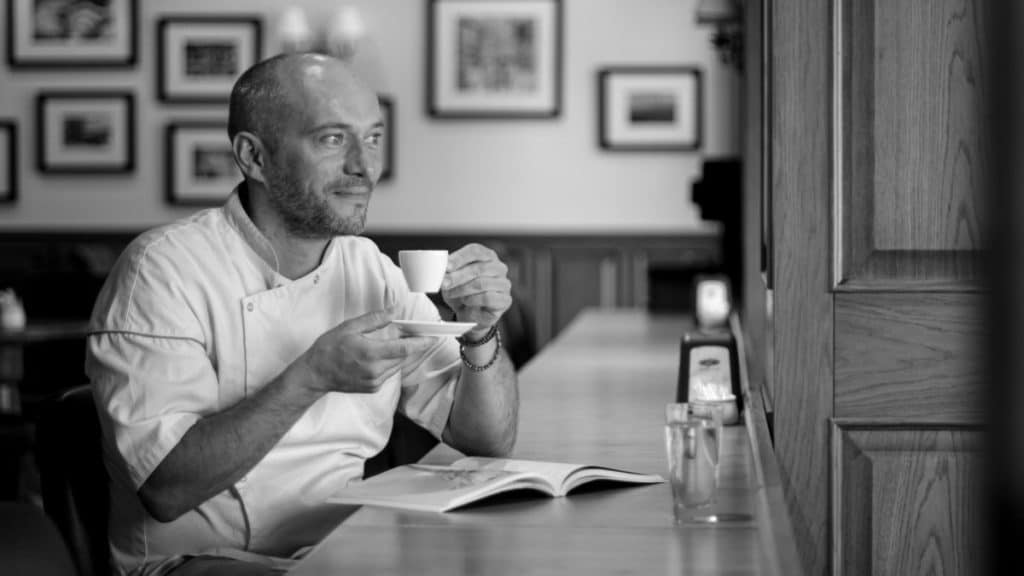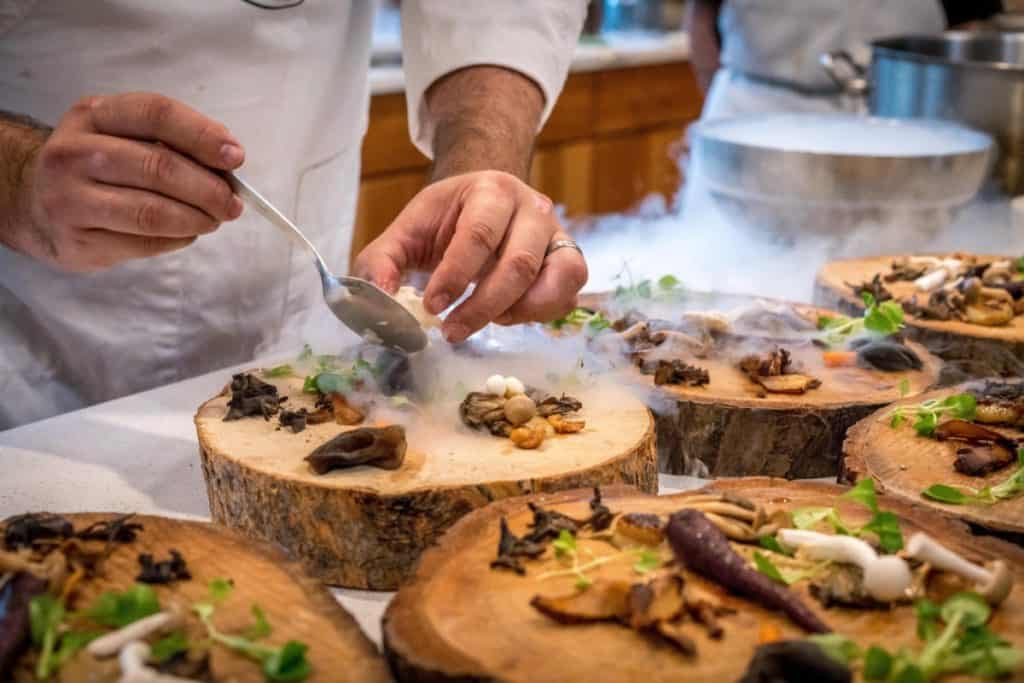
One of the greatest aspects about a career as a chef is the endless career progression opportunities. Every year thousands of new hungry chefs enter the profession ready to climb the career ladder.
Whilst the competition for promotion can be fierce the transient nature of the job ensures that there are always plenty of job opportunities available.
With this in mind I have put together this post of simple steps to help any chef get a promotion and achieve their next step up the career ladder. Whether we are hoping to make the first step from Trainee Chef to Commis, or have our sights set on that elusive Executive chef position, there is something here for everybody!
position, there is something here for everybody!
Be Consistent
Consistency is the art of perfection
This was a mantra of a Head Chef I once served under, so much so in fact, that we had a poster on the wall in the kitchen with this quote. I must agree that without consistency our hopes of promotion are pretty slim.
I once served under, so much so in fact, that we had a poster on the wall in the kitchen with this quote. I must agree that without consistency our hopes of promotion are pretty slim.
In the ultra competitive world of being a chef, it is not enough to work each day based on how you are feeling. It is important we produce great results every time we enter the kitchen.
To achieve this we need to focus on aspects such as getting enough sleep (as best as we can), not over indulging in alcohol, and maintaining our focus.
A chef which is on fire one day, but walks around like a bear with a sore head the next, does nothing to help their chances of promotion. Consistent results get noticed.
Experiment
Not as important early on in a career, but vital as we progress, is the need to experiment with cuisine and the various cooking methods.
Early on in a career a chef who turns up, works hard and produces results is an asset to any kitchen, and that’s where Commis level chefs should focus on. However, as we move up the ladder we need to start showcasing the unique skills we can bring to the party.
we need to start showcasing the unique skills we can bring to the party.
To step up to Chef De Partie level and above, the hopeful needs to demonstrate they can contribute ideas to the team. No one wants to have to babysit another employee!
level and above, the hopeful needs to demonstrate they can contribute ideas to the team. No one wants to have to babysit another employee!
Coming up with menu ideas to demonstrate to the head chef shows that we are a cut above the other candidates. The Head chef may not take these ideas on board but don’t be discouraged, they will be impressed by our passion.
Find Opportunities
When all progression routes in our current kitchen seem blocked the best option is often to leave!
This is a problem particularly in smaller kitchens. The smaller brigade can result in less movement as the chefs are content, so do not change jobs as often as in larger kitchens .
.
If we find ourselves in this type of situation, where a position does not look like it will become available for a long time, the best thing to do for our careers is to look elsewhere.
Unlike many careers, having a wide variety of jobs on our C.V is actually beneficial to chefs. Working in different kitchens provides us with a wide range of experience.
The best senior chefs are those who have worked in multiple restaurants. Those who have remained in one kitchen often find their knowledge is limited to a specific way of doing things.
Travel

Believe it or not, travelling can actually be a great way for chefs to gain promotions. Many chefs take some time out from their careers at home to explore different parts of the world.
While travelling, their love for food has them working in kitchens all around the world , or if not working; simply enjoying all different types of cuisine.
, or if not working; simply enjoying all different types of cuisine.
This kind of experience on our C.V is so appealing to recruiters. Being able to demonstrate, and bring to a new kitchen our knowledge of flavours from all around the world is a huge selling point to potential employers.
It is not only the wide food knowledge gained, travelling also demonstrates an out going and well rounded person, both great traits that employers are looking for.
Take Responsibility
Taking on responsibilities over and above what we must do is a great way of easing pressure on those above us. By taking some of the stress off their shoulders we are not only learning skills that we will need to be successful, but also getting in the chefs good books!
When interviewing for a position, whether its in our current kitchen or a potential new one, the employer will ask us various questions relating to our experiences for that role.
for a position, whether its in our current kitchen or a potential new one, the employer will ask us various questions relating to our experiences for that role.
The ‘demonstrate a time when…’ questions are common. However, they can be difficult to answer when trying to get promoted above our current role as we may not have that experience yet.
By taking on additional responsibilities early on, we gain tangible evidence which we can demonstrate to potential employers, showing we already posses the skills necessary.
This is also a great way to learn the necessary skills in a more relaxed manor. No one will get annoyed with us when we are just helping them do their job.
Complete Additional Training

Additional training may take the form of recognised qualifications such as a higher level NVQ or a more advanced Food Hygiene Certificate.
or a more advanced Food Hygiene Certificate.
A higher level NVQ can take a long time to complete, especially when studying alongside work, however it is a widely recognised qualification that helps to demonstrate our advanced knowledge.
An advanced food hygiene certificate is another great way to gain a higher level qualification in a short amount of time. Level 3 is a supervisory level, which demonstrates a chef is on their way up the ladder, but can be completed in a few days online.
Additional training can also take the form of courses in specialist areas of food production. When we take courses, such as a sushi course, or a bread making course, we demonstrate a specialist knowledge that the employer themselves might not have, and we become more valuable in the process.
Improve Our C.V
What I mean by improving our C.V is that it’s important to make it as easy as possible for the person reading it to extract the relevant information.
A successful career as a chef relies heavily on gaining the right experience in the best places . We then have to be able to demonstrate on paper, that we have that experience!
. We then have to be able to demonstrate on paper, that we have that experience!
Not as easy as it sounds. I have personally seen dozens of C.Vs where the applicant has worked in great restaurants but fail to actually show me what experience they have gained there. They could have spent 6 months peeling potatoes for all I know from looking at it!
but fail to actually show me what experience they have gained there. They could have spent 6 months peeling potatoes for all I know from looking at it!
There are lots of templates available for free on Word or Pages. Someone else has already done the hard work of laying out a C.V so piggy-back off of their experience!
Writing a personalised covering letter also falls under this category. Generic covering letters give the impression the candidate isn’t really interested, and they have a habit of ending up in the bin without ever having been read!
Learn As Many Sections As Possible
In order to progress to the more senior chef positions, an understanding of all the kitchens sections is vital. Even including at least some basic experience in pastry section!
Doing everything we can, when we are a Commis chef , to move around the various sections is vital. Get to know the chefs on the other sections and help them whenever you can.
, to move around the various sections is vital. Get to know the chefs on the other sections and help them whenever you can.
A chef may be able to work their way up on one section to become CDP but that will be the end of the road as far as their career progression goes until they can do the other sections.
but that will be the end of the road as far as their career progression goes until they can do the other sections.
The problem now is that we would have to go back down to Commis level again on a different section in order to learn it.
again on a different section in order to learn it.

In reality most kitchens are wise about the benefits of moving Commis chefs around to gain experience in every part of the kitchen. However, it doesn’t hurt to give the Head chef a gentle nudge every now and again, as a reminder that we are keen to get as much experience as possible.
Make Kitchen Friends
When we make ourselves useful, the Chef De Partie is far more likely to ask for us to go work on their section.
The opposite is also true. If we go around upsetting other members of the kitchen team, when a new chef is required to join their section they are likely to turn around and refuse to have us on it.
That may sound unfair, after all any promotion should be based on merit. The reality is that in any career the people aspect plays a huge role.
Whilst its not always easy with the long hours and heavy work load, try to be a positive influence in the kitchen. People are much more likely to notice positive chefs and lift them up, as opposed to an angry chef trying to argue and fight their way up the ladder.
and heavy work load, try to be a positive influence in the kitchen. People are much more likely to notice positive chefs and lift them up, as opposed to an angry chef trying to argue and fight their way up the ladder.
Take Part In Competitions
Chefs who take part in cooking competitions stand a much better chance of being promoted.
When taking part, our own confidence gets a boost as well as a boost to the restaurant’s name. This is one of those situations which is win win for everyone, and it really doesn’t matter which position you finish!
The owner of the restaurant we work for will suddenly notice who we are. This can be especially important in larger kitchen brigades  where it is easy to get overlooked by the highest level management.
where it is easy to get overlooked by the highest level management.
Having the owners know who we are helps with any promotion chances. As a bonus if we do place well in the competition, then we get our 5 minutes of fame within the restaurant and the local cooking community!
Competitions are also a great place to network. Chefs from the local area are all there competing and there is a great camaraderie. It never hurts to have friends that work in other kitchens who may tip us off when a job is becoming available.
To Sum Up
Going to work and putting in a good solid shift is really important, especially in the beginning of our careers , where we are trying to make the best impression possible, whilst also learning as much as we can.
, where we are trying to make the best impression possible, whilst also learning as much as we can.
As we progress though, it is important we start looking at the other areas mentioned above to kick our careers up to the next level.
Failing to take the initiative and do these extra steps can result in us being known as a solid dependable work horse.
Whilst there’s nothing wrong with being known for working hard and churning out the work, its important this isn’t all we are known for. These type of chefs can find themselves stuck on veg or banqueting sections where volume is the order of the day.
A touch or artistic flair, or initiative is needed to be viewed as more of a well rounded chef. We have to be mindful that we are working cleverly on our careers not just working hard.
If the balance between what we are getting form our job, and what they are getting becomes skewed, it’s important to address the balance either by a promotion at our existing jobs or elsewhere.
Being a chef is too much of a demanding role to be able to turn up and do our bit without our hearts being in it. The best way to keep our hearts in it; to feel like we are constantly growing!
to be able to turn up and do our bit without our hearts being in it. The best way to keep our hearts in it; to feel like we are constantly growing!
I speak from personal experience, it took me a while to realise that whilst I was working very hard, I was getting trapped in my position. I was failing to take the extra steps needed to demonstrate the other abilities I had. Just working hard isn’t enough.
Once I discovered that I had to show others what I could do, (or else how are they going to know?) things moved a lot quicker for me career wise.
I hope this guide has been helpful and readers are able to implement some of these strategies right away. Good Luck to everyone, go get that promotion!
